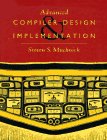
Programming Languages and Translators
Fall 2010
|
|

|
|
| COMS W4115 Programming Languages and Translators Fall 2010 |
||
| Name | Office Hours | |
|---|---|---|
| Prof. Stephen A. Edwards | sedwards@cs.columbia.edu | 3-4 M, 2-3 T, 462 CSB |
| Hemanth Murthy | hm2474@columbia.edu | 11-1 Th, TA Room (1st floor Mudd) |
| Rupal Shah | rrs2146@columbia.edu | 11-1 M, TA Room (1st floor Mudd) |
| Kapil Verma | kv2208@columbia.edu | 10-12 T, TA Room (1st floor Mudd) |
The goal of PLT is to teach you both about the structure of computer programming languages and the basics of implementing compilers for such languages.
The course will focus mostly on traditional imperative and object-oriented languages, but will also cover functional and logic programming, concurrency issues, and some aspects of scripting languages. Homework and tests will cover language issues. You will design and implement a language of your own design in a semester-long group project.
While few of you will ever implement a full commercial compiler professionally, the concepts, techniques, and tools you will learn have broad application.
COMS W3157 Advanced Programming: You will be dividing into teams to build a compiler, so you need to have some idea how to keep this under control. Quick test: you need to know about Makefiles and source code control systems.
COMS W3261 Computability and Models of Computation: You will need an understanding of formal languages and grammar to build the parser and lexical analyzer. Quick test: you must know about regular expressions, context-free grammars, and NFAs.
|
Alfred V. Aho, Monica Lam, Ravi Sethi, and Jeffrey D. Ullman. |

|
|
Michael L. Scott. |

|
|
Andrew W. Appel. |

|
|
Lawrence C. Paulson |

|
|
Steven S. Muchnick |

|
The focus of 4115 is the design and implementation of a little language. You will divide into teams and design the goals, syntax, and semantics of your language, and implement a compiler for your language.
Exception: CVN students will do the project individually.
This is a critical part of the project and will be a substantial fraction of the grade.
Include the following sections:

|
The Java white paper from Sun Microsystems |
|
|
C# Introduction and Overview |

|
Dennis M. Ritchie, C Reference Manual |
|
|
Kernighan & Ritchie, The C Programming Language |
|
|
The C Language Reference Manual (DEC) |

|
The C Language Reference Manual (SGI) |
|
|
The C Language Reference Manual (Microsoft) |
|
|
Stroustrup, The C++ Programming Language |

| The Java Language Specification |

|
The C# Language Specification |
|
|
Aho, Kernighan, and Weinberger, The AWK Programming Language |
|
EasySurvey:
Survey Generation Language
(RS)
Taotao Li Luyao Shi Zaisheng Dai Yifan Zhang |
|
eggl:
Examination Generation Grading Language
(RS)
Gordon Hew |
|
lame:
Linear Algebra Made Easy
(KV)
David Golub Carmine Elvezio Muhammad Akbar Ariel Deitcher |
|
DINO:
Language for Children
(SE)
Manu Jain |
|
MIDILC:
MIDI Language Compiler
(RS)
Benjamin Mann Ye Liu Fredric Lowenthal Alex Bamberger |
|
next:
Text-Based Computer Game Language
(KV)
Ernesto Arreguin Danny Park Morgan Ulinski Xiaowei Zhang |
|
IPCoreL:
Packet Injection Programming Language
(HM)
Phillip Douglas |
|
PCPL:
Polynomial Calculator Programming Language
(SE)
Donghui Xu |
|
DiGr:
Directed Graph Processing
(HM)
Bryan Oemler Ari Golub Dennis Perepelitsa |
|
Dynamo:
Dynamic Programming Language
(KV)
Raghavan Muthuregunathan Pradeep Dasigi Abhinav Saini Srilekha Vedula Kameswari Archana Balakrishnan |
|
GRAPL:
Graph Processing Language
(HM)
Di Wen Yi Yang Lili Chen Andres Uribe Ryan Turner |
|
HCML:
Home Construction Modeling Language
(SE)
Joseph Janik |
|
m:
Music Generation Language
(RS)
Yiling Hu Monica Ramirez-Santana Jiaying Xu |
|
Verishort:
Circuit Simulation Language
(KV)
Anish Bramhandkar Elba Garza Scott Rogowski Ruijie Song |
|
Scirch:
Circuit Simulation Language
(SE)
Brian Hunter Jeffrey Sinckler |
|
Spoke:
Spoken Dialog Management
(HM)
Yang Wang Xin Chen Chia-Che Tsai Zhou Yu |
|
Tonedef:
Music Language
(RS)
Curtis Henkel Chatura Atapattu Matthew Duane Kevin Ramkishun |
|
YAIL:
Yet Another Image-processing Language
(KV)
Andrew Kisch Aniket Phatak Pranay Prabhakar Uday Chandrasen |
|
SGDL:
Sudoku Game Design Language
(HM)
Sijue Tan Yigang Zhang Yu Shao Rongzheng Yan William Chan |
|
RSTSL:
Rocket Sled Trajectory Simulation Language
(SE)
Rui Chen |
| 40 % Project |
| 20 % Midterm |
| 30 % Final |
| 10 % Homework |
You will collaborate with your own small group on the programming project, but you may not collaborate with others on homeworks. Groups may share ideas about the programming assignments, but not code. Any two groups found submitting similar code will receive zero credit for the whole assignment, and repeat offenses will be referred to the dean. See the Columbia CS department academic policies for more details.